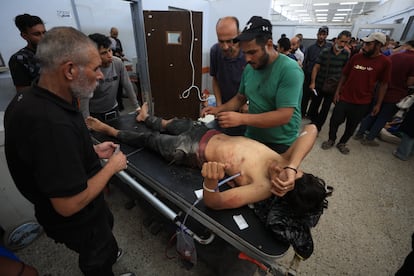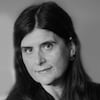A neurosurgeon from Gaza: “Medical staff can barely stand.”


Palestinian neurosurgeon Usama Aklouk (61 years old), who practiced for more than a decade in Spain and now works as a volunteer doctor at Al Shifa Hospital, answers readers' questions, which were first published in the Middle East section and which we have now compiled in this report.
Question: How is the health system functioning in Gaza?
Hello, good afternoon. My name is Gihan. I'm a girl of Arab roots born in Spain. The country of Palestine is important, at least to me. I believe countries have a lot of power, and I think they should put an end to this genocide. Now my question is, what's happening in Gaza right now? How's the healthcare system there? I'd also like to know whether humanitarian aid is getting in or not. Thank you very much.
Gihan Baba. Aldaia (Valencia) .
Answer: How is Gaza currently? Well, it couldn't be worse. Mountains of rubble, streets filled with tents or shacks where people seek refuge after their areas were declared red or combat areas by the Israeli army. Bombings can be heard at any moment, the drones drone in the sky incessantly... People search for hours for something to eat, but prices are sky-high. Every day, dozens of young people risk their lives looking for a sack of flour to feed their families, as there are no bakeries or ovens, and people have to make bread by hand and search for firewood. Since there are no trees left, people have to buy pieces of wood, for example from furniture or doors. After every attack, ambulance sirens sound in search of survivors, but often they only find charred corpses and dismembered bodies. In hospitals, which are no longer hospitals because there is hardly any medical equipment, there are lines of patients waiting to be treated. The few operating rooms are always occupied, and the medical staff can barely stand.
Q. My question is about formula milk. In cases of financial hardship, I think it's better to use breast milk, as it will always be healthier and present fewer hygiene problems. Are health authorities promoting campaigns to encourage mothers to breastfeed instead of using formula?
Anaí López Ballesteros (Madrid).
A. Thanks for the question. You see, I don't want to scare you, but this cruel war has nothing to do with what we were taught in college about motherhood and childhood, breastfeeding... Since the beginning of March, they haven't let in a single gram of milk. They don't care if the babies die of malnutrition or the mothers die of hunger. There are mothers who have no choice but to breastfeed their children to calm them down, because they have no more milk. Here we are fighting to survive.
Q. I wanted to know if I can help in any way as a teacher.
Carmen Risco Lucas (Badajoz).
A. The support that the Spanish Government is giving to the Palestinian people, the recognition of the State of Palestine, and the reduction in arms supplies to Israel deserve our gratitude. l Popular support. We saw it the other day at the start of the San Fermín Festival. We hope this support continues until this cruel war ends. On a more personal level, I request evacuation through the Spanish Consulate in Jerusalem. They have all our information since the war began. We want humanitarian refuge and to be with our families in Spain.
Q. At a time when a people are suffering so much, to what extent do you see a risk of radicalization among young people? I ask this because it always happens (and it's happening now in Israel too) that when there's war in the Middle East, resentment falls on young people, creating a risk of repeating the tragedies. How do you see the situation? Are young people ready for peace, or do you think there will be dangerous resentment?
Luis Hidalgo Perez-Aranda (Santiponce, Seville).
A. Thank you for the question. Well, I am very confident that our youth, as well as that of the Israeli people, will free themselves from all the radical ideas promoted by the far-right politicians currently in power, in order to achieve a promising future for both peoples, a future without hatred, without war, a more humane future, because what we are suffering is totally inhumane.
Do you want to add another user to your subscription?
If you continue reading on this device, it will not be possible to read it on the other device.
ArrowIf you want to share your account, upgrade to Premium, so you can add another user. Each user will log in with their own email address, allowing you to personalize your experience with EL PAÍS.
Do you have a business subscription? Click here to purchase more accounts.
If you don't know who's using your account, we recommend changing your password here.
If you decide to continue sharing your account, this message will be displayed indefinitely on your device and the device of the other person using your account, affecting your reading experience. You can view the terms and conditions of the digital subscription here.

Journalist specializing in international news. She has been a correspondent in Jerusalem, Caracas, Rio de Janeiro, and Paris, and has worked for the Agence France-Presse (AFP). She is the author of the book "La Revolución Sentimental," about Venezuela, and co-director of the documentary "Condenadas en Gaza." She currently works for the Planeta Futuro section of EL PAÍS.
EL PAÍS





